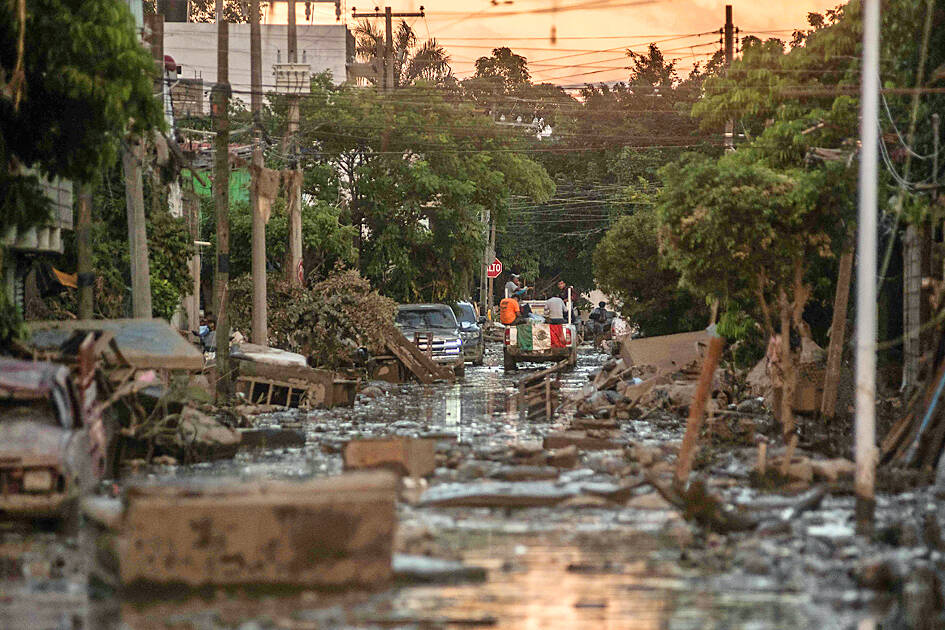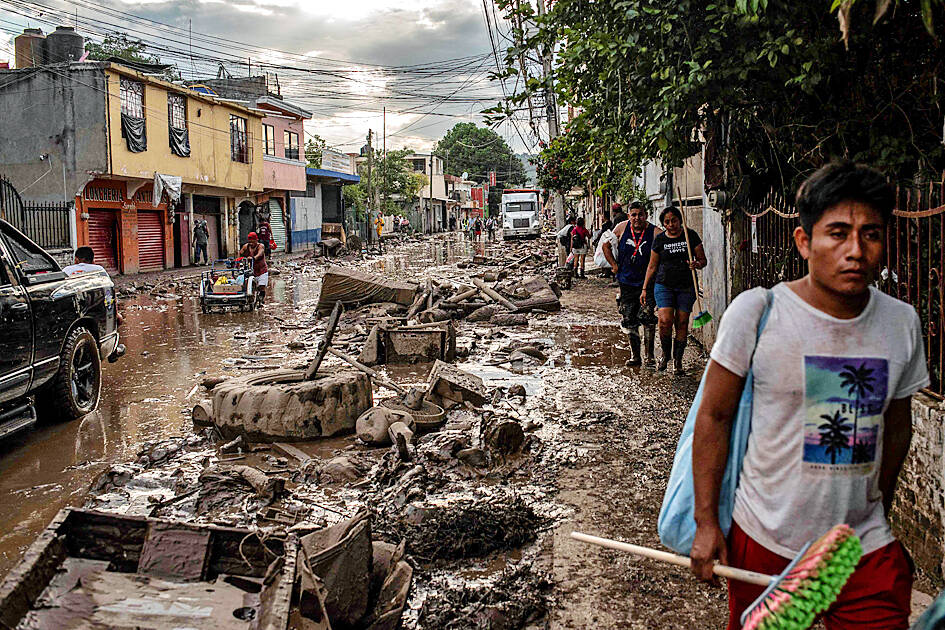When a river that winds through the mountains of central Mexico suddenly turned into a crushing wall of water over this past week, it practically wiped the 400-person village of Chapula off the map.
Residents only had time to shout, warning neighbors living along the riverbanks, and desperately seek shelter from the deadly flooding and landslides that have cut off 300 towns in central and eastern Mexico from the outside world.
Thousands of soldiers and workers on Tuesday scrambled to rescue people and unblock roads.

Photo: AFP
“There’s nothing left. It wiped out houses, it wiped out the bridge, it wiped out everything. The only thing left standing was the church and the warehouse where we were seeking refuge,” said 21-year-old Stephanie Ramirez, who was part of a group of elderly people, women and children who stumbled off a rescue helicopter on Tuesday.
The Mexican government said that at least 64 people have died due to the torrential rains.
Dozens are still missing and officials warned that the full extent of the devastation in remote towns of a couple hundred to 1,000 residents remained unknown.

Photo: AFP
The rains were triggered by the convergence of two tropical storms churning off Mexico’s western coast, striking at the end of an unusually heavy rainy season that has left rivers overflowing and hillsides weakened.
Ramirez and her grandmother were evacuated after days of hoping help would come. The rest of her family and dozens of their neighbors were still waiting to be evacuated.
As more rain threatened to pour down, they sought shelter on a nearby hillside on the verge of collapsing next to the still-swollen river.
“We have to get them out. They’re in constant danger there,” Ramirez said.
Mexican President Claudia Sheinbaum said that one of the government’s priorities was to open roads and “to secure air bridges, food supplies, water and check on how each person is faring.”
Thousands of military and civilian personnel were working tirelessly on those efforts, but in Chapula, residents organized on their own.
They called their relatives in the US “and it was them who made arrangements to get us out of there little by little,” Ramirez said.
With help from residents of the nearby town of Tianguistengo, a private air bridge began operating, using a borrowed helicopter to evacuate groups of about half-a-dozen people at a time, while other residents organized bags of basic goods to carry on foot — with some soldiers— to neighboring villages that were still cut off.
“We think it’s about six or seven hours walking, but we want people to know that we’re working ... that they can see we also care about their situation,” local resident Neptali Rodriguez said.
The hardest-hit states were Veracruz, Hidalgo and Puebla. In Hidalgo alone, where about half of the isolated villages are, about 100,000 homes were damaged or destroyed by flooding rivers and mudslides.
In Veracruz, where at least 29 people died, rainfall reached 61cm in just four days.
Veracruz Governor Rocio Nahle said that more than 300,000 people were affected in the state alone.
On Tuesday, public officials were going door-to-door in cities such as Poza Rica, Veracruz, where water from the overflowing Cazones River on Friday reached 4m high in some areas.
They were asking residents if anyone was missing.
According to the Mexican National Civil Protection Coordination, 67 people were still unaccounted for as of Tuesday.
In Poza Rica, resident Roberto Olvera said that an oil refinery alarm alerted him to rising waters.
“It was terrifying, many people in the neighborhood couldn’t escape,” he said.
Floodwaters there also left a black, oily residue believed to have come from nearby oil and gas installations, coating trees and rooftops.

DISASTER: The Bangladesh Meteorological Department recorded a magnitude 5.7 and tremors reached as far as Kolkata, India, more than 300km away from the epicenter A powerful earthquake struck Bangladesh yesterday outside the crowded capital, Dhaka, killing at least five people and injuring about a hundred, the government said. The magnitude 5.5 quake struck at 10:38am near Narsingdi, Bangladesh, about 33km from Dhaka, the US Geological Survey (USGS) said. The earthquake sparked fear and chaos with many in the Muslim-majority nation of 170 million people at home on their day off. AFP reporters in Dhaka said they saw people weeping in the streets while others appeared shocked. Bangladesh Interim Leader Muhammad Yunus expressed his “deep shock and sorrow over the news of casualties in various districts.” At least five people,

The latest batch from convicted sex offender Jeffrey Epstein’s e-mails illustrates the extraordinary scope of his contacts with powerful people, ranging from a top Trump adviser to Britain’s ex-prince Andrew. The US House of Representatives is expected to vote this week on trying to force release of evidence gathered on Epstein by law enforcement over the years — including the identities of the men suspected of participating in his alleged sex trafficking ring. However, a slew of e-mails released this week have already opened new windows to the extent of Epstein’s network. These include multiple references to US President Donald

LEFT AND RIGHT: Battling anti-incumbent, anticommunist sentiment, Jeanette Jara had a precarious lead over far-right Jose Antonio Kast as they look to the Dec. 14 run Leftist candidate Jeannette Jara and far-right leader Jose Antonio Kast are to go head-to-head in Chile’s presidential runoff after topping Sunday’s first round of voting in an election dominated by fears of violent crime. With 99 percent of the results counted, Jara, a 51-year-old communist running on behalf of an eight-party coalition, won 26.85 percent, compared with 23.93 percent for Kast, the Servel electoral service said. The election was dominated by deep concern over a surge in murders, kidnappings and extortion widely blamed on foreign crime gangs. Kast, 59, has vowed to build walls, fences and trenches along Chile’s border with Bolivia to

DEATH SENTENCE: The ousted leader said she was willing to attend a fresh trial outside Bangladesh where the ruling would not be a ‘foregone conclusion’ Bangladesh’s fugitive former prime minister Sheikh Hasina yesterday called the guilty verdict and death sentence in her crimes against humanity trial “biased and politically motivated.” Hasina, 78, defied court orders that she return from India to attend her trial about whether she ordered a deadly crackdown against the student-led uprising that ousted her. She was found guilty and sentenced to death earlier yesterday. “The verdicts announced against me have been made by a rigged tribunal established and presided over by an unelected government with no democratic mandate,” Hasina said in a statement issued from hiding in India. “They are biased and politically motivated,” she